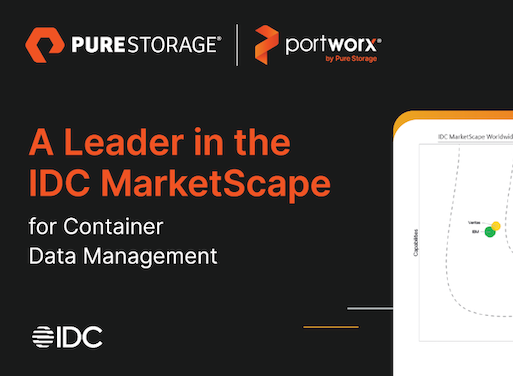Scale Containers Rapidly & Reliably
Unlock the value of Kubernetes data at enterprise scale with Portworx, which allows organizations to deliver developer self service for apps and data, build once and run anywhere, and deploy apps at scale securely and resiliently.
The Leading Container Data Management Platform for the Enterprise
Automate, protect, and unify your Kubernetes applications and data at enterprise scale anywhere (on-premise, public cloud, or at the edge) within minutes using Portworx by Pure Storage.
Storage Services
Operate at scale while saving storage costs for cloud-native storage that is optimized for containers.
Learn MoreBackup Services
Protect mission critical data with backup built for Kubernetes that is container and application aware.
Learn MoreDisaster Recovery
Deliver availability and recoverability service levels while ensuring business continuity with zero RPO for Kubernetes.
Learn MoreDatabase Services
Simplify and automate the deployment of relational and non-relational databases along with leading data services.
Learn MoreDevOps Services
Scale Platform Engineering and DevOps teams to support growing multi-cloud, hybrid-cloud and on-premises Kubernetes environments.
Learn MoreKey Partnerships
Confidently work with a partner trusted by the world’s leading technology innovators as we drive the cloud native movement forward.
Red Hat
Build, scale, and run the mission-critical applications in minutes by combining the #1 Container Data Management Platform, Portworx, with the leading Kubernetes Distribution, Red Hat OpenShift
Learn More
Amazon Web Services
Portworx by Pure Storage on AWS has been designed to provide persistent storage, data protection, disaster recovery, and data security for business-critical applications and databases deployed and managed using Data on Elastic Kubernetes Services.
Learn More
MongoDB
Unlock a consistent developer experience for all data services with first-of-its-kind integration between the industry’s first Database-Platform-as-a-Service (DBPaaS), Portworx Data Services, and MongoDB, that revolutionizes how developers build modern applications.
Learn More
IBM Cloud
Combine the power of IBM Cloud and Portworx to build a modern, multi-cloud data environment that lets you build, run, and scale the next generation of business critical applications built on Kubernetes.
Learn More
Top Resources

Upcoming Webinar
KubeCon Digest: Emerging Trends And Take-Aways From This Year’s Conference
Register Now















